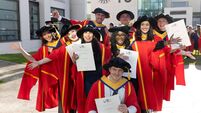Fr Liam Power: The predicted demise of religion

A study has revealed that young people and older people now attend Church in much higher numbers than the so-called middle generation (that is for 34 to 64).
The predicted demise of religion and spirituality amongst young adults: is it greatly exaggerated?
I have attended many gatherings over the past number of years, reflecting on the decline in Church attendance and the impact of secularisation on today's culture and how we might respond.
The most dominant theme in all discussions is the alienation of youth from not just the Church but from religion in general. Countless initiatives have been proposed to re-engage with the youth, but to be honest, we are really struggling to find an answer.
Some wonder if we should just accept the fact that religion is dying in Ireland and elsewhere in Europe.
Indeed, this was what was predicted by sociologists dating right back as far as the 19th century. Even famous poet, Mathew Arnold, mourned “the melancholy, long, withdrawing roar of the sea of faith.”
Sociologists and other scholars since then have predicted the death of religion in Ireland and indeed across Europe.
This prediction was reinforced by reports from about 2010 indicating that there was a huge increase in young people separating themselves from religion and Church.
We had the rise of the so-called nones (those who do not profess any religious faith). Secularisation theorists again predicted a continuous decline in religious practice.
So, I was quite surprised to learn of the results of a survey conducted by the Bible Society in Britain. The survey concluded that national Church attendance increased from 8% to 12% between 2018 and 2024. But the most surprising finding was that among young people aged between 18 to 24, attendance has shot up from 4% to a very surprising 16%.
The study revealed that young people and older people now attend Church in much higher numbers than the so-called middle generation (that is for 34 to 64).
A similar outcome was reflected in a survey carried out by Amarach Research in Ireland in February and March. Researchers found that 54% of Generation Z described themselves as religious and/or spiritual, compared with 46% of millennials. This group is also more engaged with spiritual content: 18 to 24-year-olds are more likely to read religious or spiritual books, watch related content, and follow spiritual influencers on social media, including platforms like “FaithTok,” than their older counterparts.
The results of these surveys are borne out by anecdotal evidence. I have spoken to catechists in secondary schools and also to colleagues in other parishes in different parts of the country; they agree that today there is a greater openness to spirituality and religion amongst the younger generation.
Catechists tell me that the level of engagement in religion classes in secondary schools has improved considerably in the last few years. Young people are more interested in exploring questions of faith and more open to opportunities for prayer and spiritual practices.
Westminster diocese received over 500 adults into the Church this Easter. In the same period in France over 10,000 adults were received into the Church. The 18-25 age group represented about 42% of the total adult catechumenate.
Surprisingly, this trend is more evident amongst young men than young women. There is one particular parish church in Dublin which reports a significant increase in young male adults in their twenties attending Sunday evening Mass.
Theologians, such as Tomas Halik, a brilliant Czech scholar, have attributed this rise in religiosity among the young to the search for light, freedom and meaning. The younger generation today respects the rights of minorities, and rejects racism and cultural chauvinism. They show solidarity towards people in need, particularly migrants, and often participate selflessly as volunteers in various projects and movements.
But they are desperately seeking a firm grounding, a foundation for these values.
The Christian vision provides that foundational security.
He points out that the fruits of the scientific and technological power of human rationality paradoxically have led to feelings of powerlessness. Youth see it as having brought the world to the brink of destruction.
It mirrors their own sense of vulnerability.
The younger generation are also disillusioned with the worldview promoted by the idea of an unfettered market of global capitalism. It just promotes greed and a ruthless competitiveness.
Teens and young adults have become acutely aware of the dangers of the present culture: in particular the shallowness and superficiality resulting from an overload of information that cannot be adequately processed. And there is the realisation that social networks only provide a sense of a virtual pseudo-closeness.
According to Halik, they view the world and their future in “dark hues”.
As they don’t really see any hope of a revolutionary arrival of a better future, they are searching; there is a yearning in every heart of the younger generation, a feeling of restlessness. Ultimately there is the dawning realisation that their quest is a spiritual one and only in the realm of the Spirit and faith can answers be found.
The concept of loving God, who sustains us in all our struggles and fulfils the deepest yearnings of the heart, is proving to be very attractive to Generation Z.






